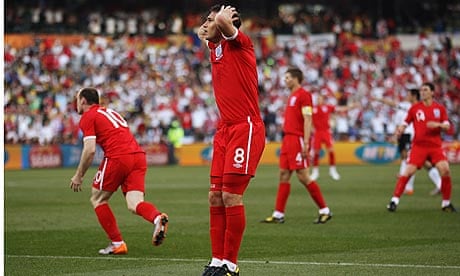If you asked Frank Lampard whether he would rather win the Champions League with Chelsea or go on a nice tournament run with England before he retires, the words Poland and Ukraine would be unlikely to feature in his answer.
Lampard, who could be dropped for the Wales game in Cardiff, will fancy his chances in the European Cup more than the European Championship.
Since November 2003 Lampard has started 66 of the 69 England matches for which he has been fit. That level of exposure to the nation's frailties would steer him towards only one conclusion. The generation unveiled to such Football Association fanfare in the Noughties know the ground beneath their feet as a trail of tears.
Why do they stick with it? Stubbornness, in some cases, but more often, one suspects, because the profile of an England player is still worth having, even when Fabio Capello sends you to your room on a perfectly nice afternoon for golf. Their agents will certainly tell them so. To wear the hair-shirt inflates commercial value except in the immediate aftermath of tournaments when players are being hung in effigy.
So the team who bombed in South Africa came back for more, under the same coach. The most intelligent among them will have considered victory at Euro 2012 virtually impossible on all known form. Spain are world and continental champions. Germany have reinvented themselves. France will recover from their mutiny. Smaller European countries gain strength.
Heading into this qualifying campaign there was no basis for believing England could progress under Capello from the nadir of the South Africa campaign to European supremacy.
But like a Beckett character mumbling – "I can't go on, I'll go on..." – England's most senior players keep putting one foot in front of the other, except that Lampard may now be told to park himself on the bench. Before Gareth Bale was ruled out with hamstring trouble, the word was that Lampard would be dropped in favour of West Ham's Scott Parker: not because old Lamps is past it, necessarily, but more to provide a better balance in the centre of midfield, where a Lampard-Jack Wilshere combination lacks defensive rigour.
Whether England need a holding midfielder against Wales is not really the point, because Capello is trying to build a side capable of advancing beyond tournament quarter-finals, and convention dictates he will need at least one screening player to nullify the best opposition. After the friendly in Denmark, where the Chelsea man was captain for 45 minutes, Capello concluded Lampard and the wunderkind, Wilshere, were both too attack-inclined to provide the required security.
With no Bale to scorch the Cardiff grass on England's right side, there is no need to use James Milner as a second blocker in front of Glen Johnson.
The problem in the centre, though, is unaltered, so Lampard (84 caps and 20 goals over 12 years) is battling it out not only with Gareth Barry but a colleague who flopped at Chelsea and has four international appearances to his name.
However valiant Parker's work at West Ham it remains hard to picture him with three Premier League titles or 27 goals from central midfield, Lampard's sparking haul from Chelsea's 2009-2010 campaign. Parker is a fine club player who may be promoted by England not for his ability so much as his tactical usefulness. Lampard is a Premier League great who would find it hard to defend the accusation that his England career, agonisingly, has never really taken off.
Incredibly either Lampard or Steven Gerrard or both have played in every competitive England fixture since the quarter-final defeat to Brazil in 2002. Wilshere, not Parker, is bringing the curtain down on this underachieving duopoly, to which whole prairies of newsprint have been devoted. Lampard and Gerrard are strong, marauding types, emblematic of their clubs. Wilshere's greater artistry is more in tune with the times, as defined by Spain.
When the obituaries do roll for Lampard's international career, his non-goal against Germany in Bloemfontein will be imbued with heavy symbolism. The bounce of the ball, two feet over the goalline, is the nearly-moment of all his time in an England shirt. The World Cup had decided to remain unkind to him. There is still time to paint a brighter sheen on those memories but there is no automatic place for him in this side.
His perseverance is itself a sign that he is blessed with a quality his critics say he lacks: a real appetite for international combat. Stamford Bridge has been such a grand stage for him that you can understand his inability to adapt to such a dysfunctional national team culture. He is a great player who played for a flawed England team rather than a great England player. His real country is Chelsea.
